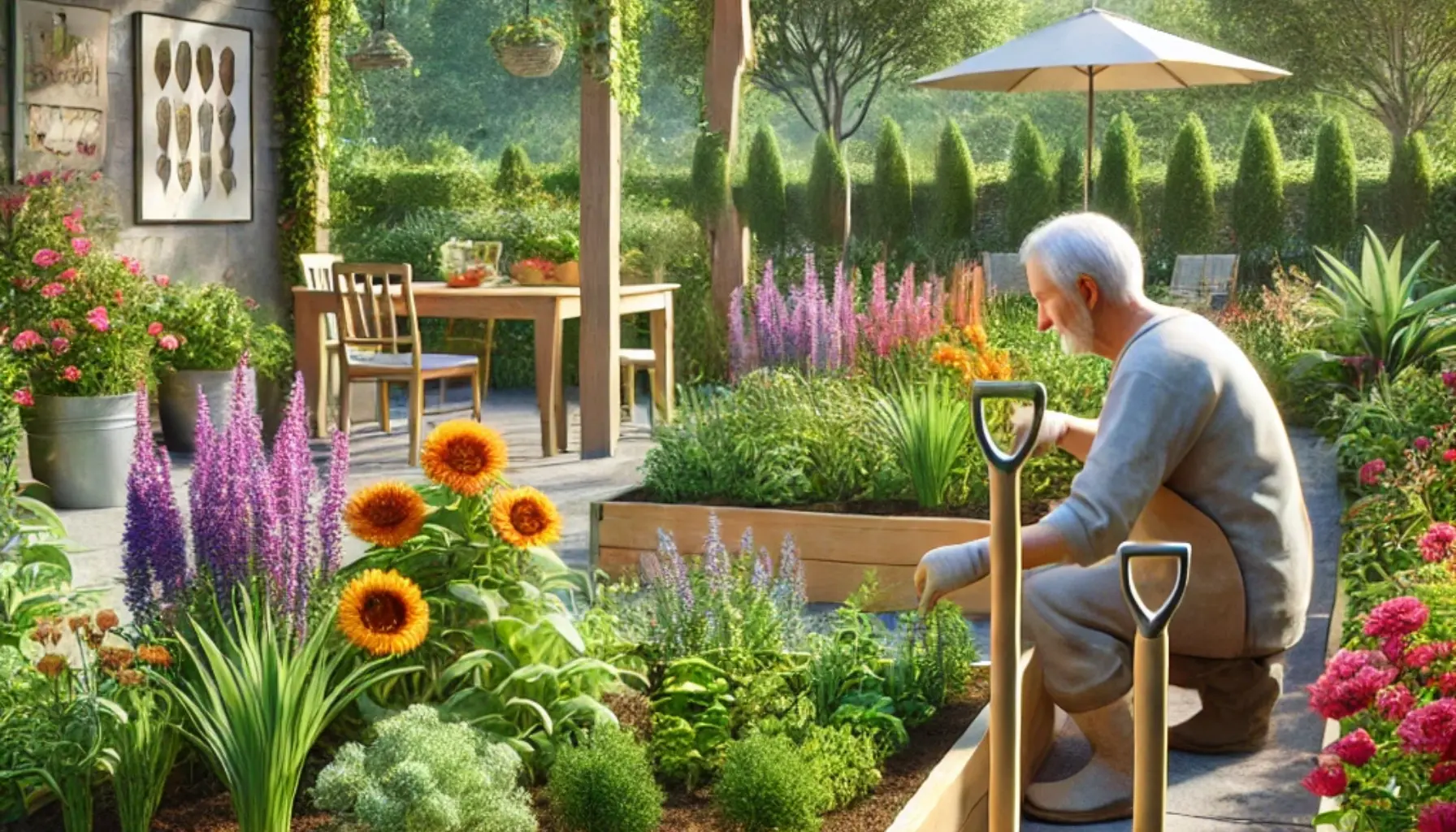Gardening is more than a hobby—it’s a therapeutic activity that can significantly enhance the physical, cognitive, and emotional well-being of older adults. As we age, staying active and mentally engaged becomes crucial for maintaining quality of life. Gardening provides a low-impact, rewarding way to stay connected with nature while improving health and happiness.
This article explores the benefits of gardening for seniors and offers practical tips for making it an integral part of healthy aging.
The Link Between Gardening and Healthy Aging
Gardening offers a unique blend of physical, mental, and emotional benefits, making it an ideal activity for seniors:
- Promotes Active Living:
- Engages the body in gentle yet effective physical activity.
- Enhances Cognitive Function:
- Tasks like planning, planting, and tending to a garden stimulate the brain.
- Boosts Emotional Health:
- Time spent outdoors reduces stress and fosters feelings of calm and joy.
- Fosters Purpose:
- Nurturing plants provides a sense of accomplishment and routine.
- Encourages Social Interaction:
- Community gardens or gardening groups provide opportunities to connect with others.
Gardening is a holistic approach to healthy aging that enriches both mind and body.
Physical Benefits of Gardening for Seniors
Gardening is a form of light exercise with numerous physical advantages:
- Improves Mobility and Flexibility:
- Activities like digging, planting, and weeding keep joints and muscles active.
- Supports Cardiovascular Health:
- Regular movement increases heart rate and circulation.
- Enhances Strength:
- Lifting small tools, watering cans, or soil bags builds muscle tone.
- Boosts Immunity:
- Exposure to sunlight helps the body produce vitamin D, which strengthens bones and the immune system.
- Encourages Better Sleep:
- Physical exertion and time spent outdoors can lead to more restful nights.
These benefits make gardening a safe and enjoyable way to stay physically active in later years.
Cognitive and Emotional Impacts of Gardening
In addition to physical benefits, gardening profoundly impacts mental health and cognition:
- Stimulates Memory and Problem-Solving:
- Planning and maintaining a garden help sharpen focus and organizational skills.
- Reduces Stress and Anxiety:
- Gardening is known to lower cortisol levels and promote relaxation.
- Fosters Mindfulness:
- The sensory aspects of gardening, such as touching soil or smelling flowers, encourage being present in the moment.
- Inspires Creativity:
- Designing garden layouts and selecting plants nurture a sense of artistic expression.
- Builds Resilience:
- Overcoming gardening challenges, like pests or weather changes, teaches adaptability.
These cognitive and emotional benefits make gardening a therapeutic activity for seniors.
Recommended Plants for Seniors
Choosing the right plants ensures an enjoyable and low-maintenance gardening experience:
- Herbs:
- Basil, mint, and thyme are easy to grow and can be used in cooking.
- Flowers:
- Marigolds, zinnias, and sunflowers add vibrant colors and are simple to care for.
- Vegetables:
- Lettuce, cherry tomatoes, and radishes grow quickly and are rewarding to harvest.
- Succulents:
- Require minimal watering and are perfect for indoor or outdoor gardening.
- Climbing Plants:
- Morning glories or beans create vertical interest and are easy to maintain.
Selecting low-maintenance plants keeps gardening enjoyable and stress-free.
Adapting Gardening for Safety and Comfort
Seniors can enjoy gardening safely with a few adjustments:
- Raised Garden Beds:
- Reduce the need for bending and make planting more accessible.
- Lightweight Tools:
- Use ergonomic tools with padded handles to minimize strain.
- Non-Slip Surfaces:
- Ensure pathways and work areas are stable and safe to walk on.
- Seating Options:
- Add benches or stools to provide rest areas during gardening sessions.
- Shade and Hydration:
- Work in shaded areas and stay hydrated to avoid overheating.
- Wear Protective Gear:
- Use gloves, hats, and sunscreen to protect skin and hands.
These adaptations make gardening more comfortable and reduce the risk of injury.
Incorporating Gardening into a Healthy Aging Routine
Making gardening a regular part of life is easier than you might think:
- Start Small:
- Begin with a few pots or a small garden bed to build confidence.
- Set a Schedule:
- Dedicate specific times of the day for gardening activities.
- Join Gardening Groups:
- Participate in community gardens or clubs for support and social interaction.
- Combine Gardening with Other Activities:
- Pair gardening with walks or yoga to create a balanced wellness routine.
- Celebrate Success:
- Share harvested produce or bouquets with friends and family for added joy.
Integrating gardening into daily life fosters consistency and enhances its benefits.
Inspirational Stories: Gardening and Healthy Aging
Around the world, seniors are finding renewed vitality through gardening:
- Therapeutic Gardens:
- Senior care facilities are incorporating gardens to improve residents’ mental and physical well-being.
- Community Success Stories:
- Retirees in urban areas are transforming unused spaces into thriving community gardens.
- Personal Accounts:
- Individuals credit gardening with helping them recover from illness or cope with loneliness.
These stories highlight the transformative power of gardening for seniors.
Conclusion: Embrace Gardening for a Healthier Tomorrow
Gardening is more than an enjoyable pastime—it’s a powerful tool for promoting healthy aging. From physical fitness to cognitive stimulation, this activity nurtures the body and soul, providing seniors with a fulfilling and purposeful way to connect with nature.
Whether you’re a seasoned gardener or a beginner, it’s never too late to start. Embrace gardening today and watch it transform your health and happiness for years to come.

